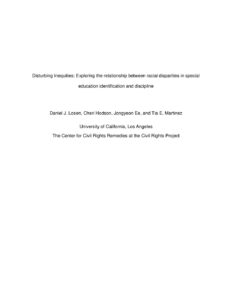Abstract
The purpose of this exploratory study was to investigate the extent to which Canadian students with Aboriginal status (i.e., Native American students) receive disproportionate levels of Office Discipline Referrals (ODRs) and more severe administrative consequences relative to students without Aboriginal status. The participants were all 1750 students in five British Columbia and Alberta elementary and middle schools implementing PBIS, with adaptations to be more responsive to Aboriginal culture. Binary multilevel logistic regression was used to determine to what extent disproportionality was present. Contrary to hypotheses, Students with Aboriginal status were no more likely to receive ODRs than students without Aboriginal status. Students with Aboriginal status were more likely, but not statistically significantly more likely, to receive suspensions and harsh administrative consequences from ODRs. Potential factors for these encouraging findings include the small sample, the Canadian context, and implementation of PBIS with culturally responsive adaptations for students from Aboriginal cultures. Results are discussed with respect to how these findings may contribute to reducing disproportionate discipline for Native American students in the United States.
In compliance with the UC Open Access Policy, this report has been made available on eScholarship:
